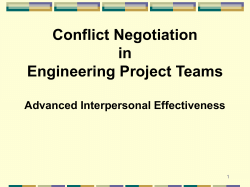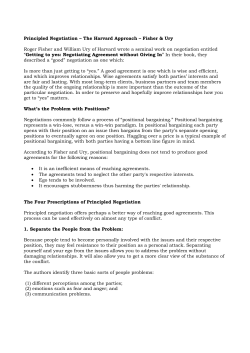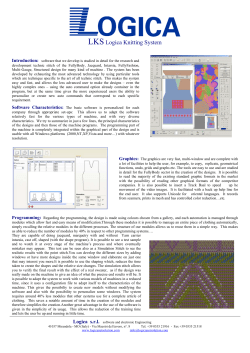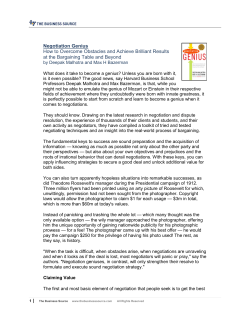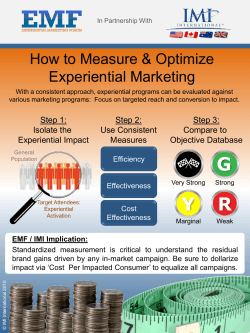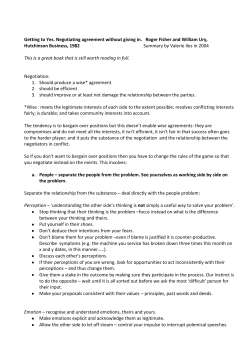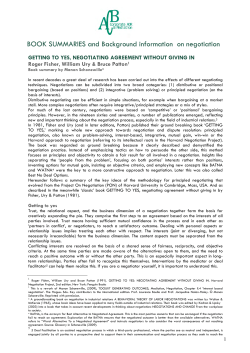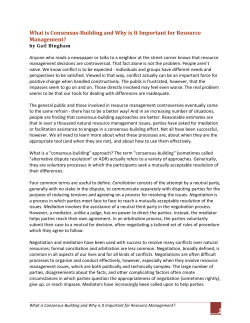
Sample Leadership Program MOMENTUM LEADERSHIP
Sample Leadership Program MOMENTUM LEADERSHIP At Leadership Worldwide our programs are tailored to suit your specific needs and to address the ‘gaps’ identified by our various organisational assessments. However, to give you a better idea of the type of content covered in our leadership programs, please find below an example of a recently delivered program for a major national accounting firm. Also see the leadership competencies used to build various programs Sample Program (delivered to a major national accounting firm) THE MOMENTUM LEADERSHIP PROGRAM Aims/content To deliver a programme focussing on the key leadership skills and attributes identified in the recent client Values and Behaviour Assessment. We believe that this is as much a Personal Development programme as a Leadership programme. This is because ultimately an organisation can only provide exceptional leadership if it is staffed by people with exceptional attitudes, beliefs and understanding of themselves and others. Program content includes the following key leadership areas and skill-sets … • • • • • • • • • • • • • • • Personal mastery Communication Leadership vs. Management Emotional Intelligence Relationship management Delegation Team development Presentation Consulting (client acquisition, retention and loyalty) Counselling Appraisal Problem solving Listening skills Giving and receiving feedback Understanding individual motivation The methodology will involve active participation. Participants will take away an experience, not just content. Presenter Information The programme will be conducted by Darryl Blake. Darryl has a long professional association with leading accounting firms. He has delivered leadership training over the past 10 years to such firms as PWC, HLB, BDO, Coopers, Grant Thornton, Hanrick Curran etc. He has also developed numerous programmes for National CPA conferences and the Australian Chartered Accountants Training Group. Read more about Darryl Blake. Programme Logistics The programme is modular in nature, and as such can be delivered in a variety of formats depending on client needs, specific learning outcomes and logistical challenges. Investment Pricing for professional services is calculated on a daily fixed fee (or part there-of) plus travel costs. Delivery fees include consulting, design and programme preparation. The fee rate for Darryl's services is $4500 per day. Check current fees Method Our training methods use a variety of presentation, workshop and experiential educational formats that are proven to be stimulating and effective. They are interactive and provide a dynamic, conducive and enjoyable environment for adult learning to take place. I HEAR............I FORGET I SEE.................I REMEMBER I DO.........................I UNDERSTAND A series of small activities encourages participation and keeps the programme interesting and involving. All participation is rewarded in an atmosphere of acceptance and with respect for peoples’ experience and background. Educational formats that will be used are.... • • • • • • Problem Solving and Team Initiative Tasks Experiential Learning Activities Group Brainstorming Neuro Linguistic Programming Participative Workshops Action and Accelerated Learning Techniques Format The format will primarily consist of workshops, exercises and debrief sessions. Some outdoor processes will also be utilised including both low level and high level challenge activities (ropes courses, abseiling etc.) and other experiential problem solving exercises. continue reading content / modules Content / modules Module 1 - Introduction to the Programme Objective To set the framework for the entire programme, addressing issues such as purpose, process and pay-offs. Content Welcome and introductions How we learn best What gets in the way of the learning process Whole brain learning Understanding Leadership and the challenge ahead A leadership Framework – reconciling theory and practice Module 2 - Working on Self Objective This module is designed to help participants examine themselves, their behaviours and their attitudes. Participants understand why they are as they are, and are given the tools to change those things that do not help them to be the best that they can possibly be. This module is an essential building block, as it provides the mechanism for change whilst removing any impediments that could hold one back from implementing upcoming modules. Content Introduction to Self Image psychology How our mind works Making changes - to how we see self, others and our interactions Putting our unconscious mind to work Utilising our whole brain for success Being the person we want to be - on purpose Leadership as a set of habits Module 3 - Working with others Objective Leaders must understand how others communicate, take in information, process and make decisions, and orient themselves to their world. By learning to allow for natural differences in style and personalities, we can use the appropriate style to achieve results with others. Leaders also become more aware of their own ‘bias’ when dealing with others. Content How to improve your impact on those around you. Recognise the basic personality styles – how they communicate and make decisions. Gain a better understanding of yourself and the people around you. Build better teams. Improve communication skills. Reduce stress and conflict. Understand how personalities can affect the business process. continue reading more modules Module 4 - Leadership vs Management Objective This module explores the difference between management and leadership, and the behaviours required to be successful in both capacities. Content Taking a whole brain approach – Managing from the left and leading from the right Recognising your leadership style Left brain skills and strategies for managers Right brain skills and strategies for leaders Balancing styles Communication systems for leaders Module 5 - Building Effective Teams Objective Leaders must be able to engage both the hearts and minds of team members, and at the same time build co-operation between all members of their teams. This module explores the keys to building high performing teams, and how to overcome some of the obstacles that can get in the way. Content Three keys to Co-operation Four stages of Team Development Creating an environment for Effective Teams Task vs Relationship for Teams G.R.I.P. - Four ingredients for Effective Teamwork Dealing with conflict effectively From teamwork to synergy Creating ‘rules of the game’ for your team Module 6 - The Outdoor Challenge Objective Putting Team and Leadership theory to the test is what this module is all about. In this range of outdoor activities participants gain a powerful insight into how support, encouragement, and a common purpose can lead to excitement and success for the team and its members. Individuals will experience the power of support in achieving personal goals, and many will push themselves beyond apparent limitations. This session can reawaken the desire to achieve, to grow, to succeed - where the joy of challenge is reason enough to push beyond what previously was. This session shows that the application of ‘soft skills’ leads to hard results. Content Low ropes, high ropes, outdoor problem solving activities etc. followed by debrief. continue reading more modules Module 4 - Individual Differences and Motivation Objective People always have a reason for what they do. Understanding what drives behaviour is an essential prerequisite for in turn eliciting desirable outcomes from team members. This module explores how to manage the individual differences and motivational drivers of those within the teams we lead. Content Understanding Human Motivation How to change peoples Behaviour - producing desirable results Two keys to Motivation Goal Driven Behaviour Developing a Systematic Approach to Motivating others A case study in motivation – changing the behaviours of an individual within your team! Module 8 - Consulting (Client acquisition, retention & loyalty) Objective The skills involved in gaining and maintaining clients are not generally taught in most professions. This module is an opportunity to fast track the approaches that work for accounting professionals. Content Building Successful Client Relationships Understanding what clients Really Want Task vs Relationship Left and Right Brain approaches to winning Client Loyalty Managing the Moments of Truth with your clients Turning Clients into Advocates Strategies to take away…'c9 Module 9 - Delegation Objective Working effectively through others is essential to our success as managers and leaders. If you still have a nagging doubt that the only way to be sure of getting a job done right is to do it yourself, then this is the session for you! Content Keys to effective delegation Overcoming barriers to delegation Benefits of effective delegation Identifying what can be delegated Pitfalls to avoid when delegating Empowerment - the difference between delegating and 'dumping' continue reading more modules Module 10 - Negotiation Objective Effective negotiation is an essential tool when dealing with colleagues, team members and clients. This module explores an approach that moves oneself toward a desired outcome and preserves the relationship. Content Counter-intuitive approaches ... going against what we would normally do How to make a compelling presentation of your case The negotiation cycle Personality differences in Negotiation Three keys to Negotiation Frameworks Flexibility in Negotiation Preparing the Environment Negotiation and a Win-Win approach Understanding the Range of negotiation ... before you negotiate Negotiating from their model of the world 50 Negotiation tactics Module 11 - Presentation Skills Objective In a modern corporate environment we are often called upon to present to others. This may take the form of addressing meetings through to speaking in front of large gatherings of peers or clients. This programme is designed to assist in the development of presentation and public speaking skills for those who need to stand up in front of a group confidently and present in an interesting and involving fashion. Content Using whole brain presentations Keeping people interested The art of the story teller Structure that works Projection Increasing your vocal variation Making impromptu easy Using emotion Resourceful states continue reading more modules Module 10 - Lateral thinking & Problem Solving Objective This module explores some of the benefits and techniques of lateral thinking and problem solving. These can be used for the development of successful solutions to everyday business and team problems. Content Understanding the difference between lateral and vertical thinking The advantages of lateral thinking Using lateral thinking by choice Lateral thinking tools from De Bono – ‘Provocation’ and ‘Concept Fans’ Generating multiple solutions for problems The Six Thinking Hats for problem solving meetings motivation worldwide | 1800 249 352 | info@motivationww.com
© Copyright 2025





